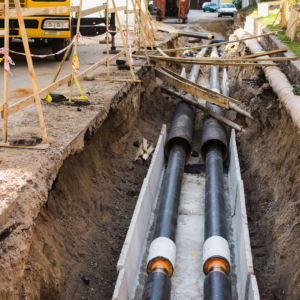DelVal Residents See Higher Utility Bills

Delaware Valley residents are feeling the financial pinch. They’re not only paying higher prices for gasoline and food. Now their utility bills are also skyrocketing.
Cheltenham resident Elizabeth Tsingelis opened her combination water and sewer bill from Aqua PA last month to find it went from $43 to $184.
“My sister (who lives around the corner) had a $90 water bill and it went up to $315,” she said. “We were three people here in the summer. Her family is five people. And we don’t understand where it’s coming from.”
Wholesale utility prices (the price at which energy suppliers pay for water, gas, and electricity) have risen due to an increase in global demand as major economies have simultaneously climbed out of the pandemic-induced recession. The price increases have risen steeply since October 2021. Natural gas prices have hit a record high as the world emerges from a lockdown.
Utility companies are now passing that cost on to consumers.
“Power generators that had been shut down could not ramp up in time to meet renewed demand,” says Jonathan Stern of the Oxford Institute for Energy Studies. Electricity demand is set to increase further as a result of rising household incomes and growing demand for digitally connected devices and air conditioning.
After falling by about 1 percent in 2020 due to the COVID-19 pandemic’s impact, global electricity demand is growing by close to 4 percent in 2022 – driven by the global economic recovery– according to the latest edition of the International Energy Agency’s semi-annual Electricity Market Report. Most of the increase in demand is expected to come from the Asia Pacific region, primarily China and India.
The Pennsylvania Public Utility Commission (PUC) has approved what it called substantially lower than requested increases in rates for water and wastewater services provided by Aqua PA Inc. (Aqua Water) and Aqua Pennsylvania Wastewater Inc. (Aqua Wastewater), headquartered in Bryn Mawr.
The commission voted 3-0 on May 12 to approve an increase in annual revenue of approximately $50.51 million (9.88 percent) for Aqua’s water service and an increase in annual revenue of approximately $18.74 million (50.55 percent) for wastewater service – approximately 30 percent lower than what the company originally requested.
The PUC announced utility rates rose last June 1 from 6 percent to 45 percent for those consumers who don’t shop for suppliers in the online marketplace.
Aqua serves parts of Berks, Bucks, Montgomery, Delaware, and Chester Counties. Aqua Wastewater provides wastewater service to approximately 40,284 customers in portions of more than 40 municipalities throughout 15 Pennsylvania counties. The two companies serve nearly 1.5 million people throughout the state.
“Our May 2022 rate increase request was made to cover the three-year period of major capital investment and operating expenses since our last request in 2018,” said Chris Franklin, Essential chairman and CEO. “The overwhelming majority was related to our capital investment of $1.1 billion (through the future test year of 2023) to improve water quality and customer service, including a new financial reporting system, SAP, to replace the company’s 25-year-old software, and reliability for about 490,000 water and wastewater customers throughout Pennsylvania. We also opened a new state-of-the-art environmental laboratory in 2021 to help us continue our long history of providing safe drinking water to our customers and returning clean wastewater to the environment.”
Franklin added, “Inflation was generally estimated in our operation and maintenance costs, but not at today’s current rates. However, Aqua is not currently passing on those additional costs to customers.”
Most Aqua residential customers using 4,000 gallons a month currently pay an average of $69.35 for water and $55.51 for wastewater. Most receive only water service.
The precise impact on Aqua customers was filed in a required tariff report filed by Aqua in July which spelled out new charges for various rate zones across Pennsylvania. The PUC’s policy is to gradually unify charges across its system so that the costs are shared equitably among all customers. Under that policy, customers in low-rate towns acquired by Aqua will eventually see their rates rise to match the majority of customers.
“For electric and gas in the Delaware Valley, PECO negotiates for lower energy prices. It does not generate electricity, it’s a distributor,” says Greg Smore, senior manager of communications.
“New and higher gas costs influence electric rates for the year. Prices are adjusted quarterly to current market trends – the rising costs of everything else – increased electric supply costs, and geopolitical issues (like the war in Ukraine). It costs power plants more now to produce electricity,” he said.
Natural gas is the plant fuel supply source that is trending higher now. It is the main cost for power plants to produce more electricity. Costs are then passed along to what PECO pays for supply, and passed along at the lowest price possible. But natural gas was lower for consumers in September, falling to 0.81790 cents per centum cubic feet (CCF). However, electricity increased by $6.10 per customer for the average usage of 700 kWh. These past summer months energy increased in usage due to higher air conditioning use.
PECO consistently encourages customers to use company energy efficiency programs and 12-month budget billing assistance programs. Despite rising than normal consumer pricing, there was no increase in customer complaints, which remained steady. Smore indicated, “We’re not seeing a significant increase in customers not being able to pay their bill, but we are encouraging customers to take advantage of financial assistance and bill relief programs.”
An advocacy group known as Keep Water Affordable, led by co-founder Bill Ferguson, is fighting the trend of utilities buying municipal water and sewer systems. Ferguson said Aqua Water and PA American Water, which he called “Big Water,” have a primary mission to acquire distressed municipal water systems at a “fair market value” and turn a profit.
“State regulation offices have stacked their efforts against local citizens,” he told the DVJournal. “This isn’t a fair system to ratepayers. Real users are seeing large rate increases as a result,” he noted. In the recent past, he attended public meetings involving Bucks County, Tredyffrin Township, and Chester Water Authority (CWA) to express objections to those municipal water systems being bought by “Big Water.”
His advocacy group’s efforts helped stop the Bucks County and Chester Water Authority municipal water systems not being sold to “Big Water.” Tredyffrin Township’s municipal sewer system was, however, purchased by Aqua PA. Area residents are mounting a major effort to try and stop municipal water buyouts through a state Supreme Court case, he said.
Please follow DVJournal on social media: Twitter@DVJournal or Facebook.com/DelawareValleyJournal



